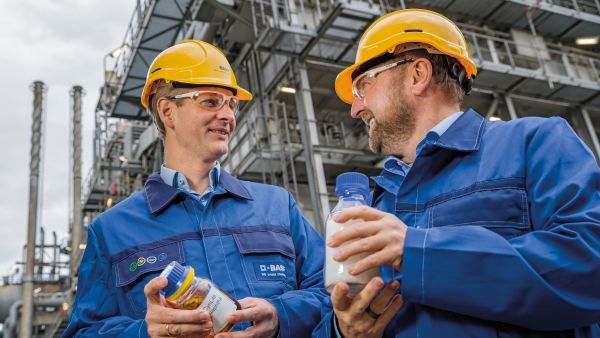BASF passes a new frontier in recycling plastic waste with its ChemCycling project. Chemical recycling offers an innovative way of recycling plastic waste that can not currently be recycled, such as mixed or dirty plastics.
Depending on the region, such wastes are usually sent to landfills or burned with energy recovery. But chemical recycling offers an alternative: By using thermochemical processes, these plastic materials can be used to produce synthesis gases or oils. The resulting recycled raw materials can be used in BASF production, thus partially replacing fossil resources.
BASF has for the first time manufactured products based on chemical recycled plastic waste and is thus one of the global pioneers of the industry.
"A responsible use of plastics is crucial to solving the problem of waste. This is true for companies as well as for institutions and consumers. By chemical recycling, we want to make a serious contribution to reducing the amount of plastic waste, "said Martin Brudermüller, chairman of BASF SE's Chief Technology Officer and Chief Technology Officer (CTO).
"Through the ChemCycling project, we transform plastic waste into a resource. This creates value for the environment, society and economy. We joined forces with partners in the value chain to establish a circular working pattern, "said Brudermüller.
BASF works closely with its partners and customers, from waste management companies to technology providers or packaging manufacturers, with the goal of building a circular value chain.
From waste to cheese packs and refrigerator components
BASF is already developing pilot projects with ten clients from various industries, including mozzarella packaging, refrigerator components and insulation panels.
Manufactured products that meet the highest quality standards and hygiene - especially needed for food packaging - is possible because BASF's ChemCycling products have exactly the same properties as products made from fossil resources.
Stefan Gräter, chief of ChemCycling's BASF project, sees great potential: "This new recycling provides opportunities for innovative business models for both us and our customers who value products and packaging made from recycled materials but who can not or do not want to make the slightest compromise when it comes to quality." As a next step, BASF intends to market the first products of the ChemCycling project.
BASF Verbund offers ideal conditions for ChemCycling
At the beginning of the production chain, BASF introduces into the production network an oil obtained from plastic waste.
BASF receives this raw material for pilot products from partner Recenso GmbH, Germany.
Alternatively, synthesis gas obtained from plastic waste could be used. The first batch of this type of oil was used in the thermal cracking process at BASF at the Ludwigshafen plant in October.
Thermal cracking is the starting point of the production processes in a combination. At this stage the raw material (oil) is decomposed at temperatures of about 850 degrees Celsius.
The primary derivatives resulting from the process are ethylene and propylene. These basic chemicals are used in Verbund in the production of many chemicals.
The proportion of recycled raw material can be mathematically allocated to the manufacturing process for each final certificate product. Thus, each customer can decide the percentage of recycled material allocated.
Technological and regulatory challenges
Both the market and the company expects industry to come up with constructive solutions to manage plastic waste.
Chemical recycling is an innovative addition to other recycling and waste management processes.
"We need a wide range of recovery options for plastic waste, because not every solution is suitable for any type of waste or any final product. The first choice should always be the solution that has the best results in a life cycle assessment, "said Andreas Kicherer, Sustainability Expert at BASF.
In any case, before the project is ready for marketing, it must meet the technological and regulatory conditions.
First of all, existing technologies for converting plastic waste into recycled raw materials, such as pyrolysis oil or synthesis gas, must be further developed and adapted so as to ensure consistently high quality.
In addition, regional regulatory frameworks will considerably influence the extent to which this approach can be adopted by each market.
For example, it is essential that chemical recycling and the use of a certain percentage of recycled raw materials in the production process are recognized as factors contributing to specific recycling targets
Responsible handling of plastic wastes is crucial
Plastics provide many benefits in technical applications, medicine and everyday life, and are often a better alternative to other materials.
The challenge lies in the responsible management of post-consumer plastics. Functional waste management systems and consumer responsible behavior with respect to plastics are crucial to solving problems such as plastic pollution. To this end, BASF is involved in various international projects as an associate member. For example, the company is a member of the World Plastics Council and participates in two programs of the Ellen MacArthur Foundation.
In addition, BASF has implemented Clean Sweep®, an international initiative of the plastics industry to prevent the dissipation of pellets, flakes and plastic powder into the environment.
BASF's new ChemCycling project is another milestone in responsible resource use and an example of how BASF specifically addresses global challenges while helping customers reach their goals.


































